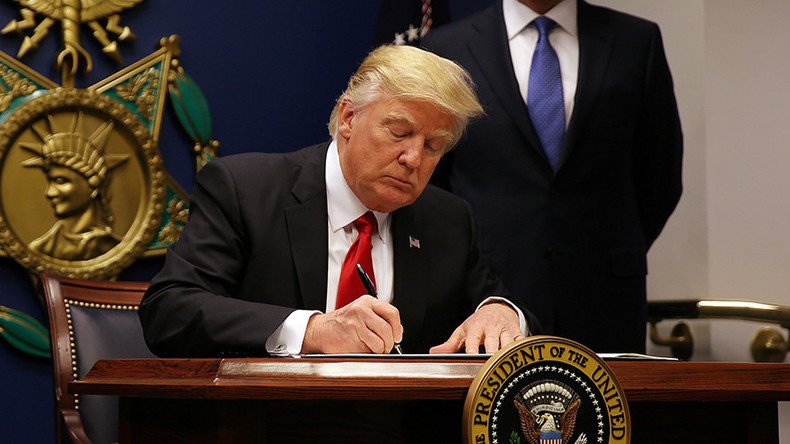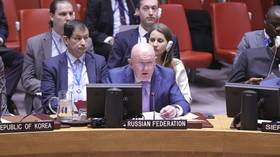Trump asks US Supreme Court to uphold travel ban

President Donald Trump has asked the US Supreme Court to uphold his temporary travel ban, currently stalled after federal courts said it amounted to religious discrimination against Muslims. Civil rights groups have vowed to fight the “hateful” order.
The Department of Justice (DOJ) filed a motion before the Supreme Court on Thursday evening, asking the nine justices to expedite the case. If the court accepts the filing, the case could be heard at the beginning of their next term, in October.
“We have asked the Supreme Court to hear this important case and are confident that President Trump’s executive order is well within his lawful authority to keep the nation safe and protect our communities from terrorism,” DOJ spokeswoman Sarah Isgur Flores said in a statement.
The March 6 executive order sought to impose a 90-day suspension on entry into the US from Iran, Libya, Somalia, Sudan, Syria and Yemen, citing terrorism risks and the perceived inability of their governments to provide appropriate security screenings. It was an update of an earlier order from January 27, which also encompassed Syria.
Muslim groups have protested the order as discriminatory, while civil rights groups such as the the American Civil Liberties Union (ACLU) argued that it violated the US Constitution’s Establishment Clause. Reacting to the government’s filing, the ACLU vowed to fight the “hateful ban,” adding a hashtag “#NoMuslimBanEVER.”
We've beat this hateful ban and are ready to do it again, @realDonaldTrump. #NoMuslimBanEVER
— ACLU National (@ACLU) June 2, 2017
The Supreme Court will rule whether Trump’s campaign rhetoric can be used as evidence that the executive orders were intended to discriminate against Muslims. With the addition of Justice Neil Gorsuch in April, the court is seen to have a conservative majority. Gorsuch was nominated by Trump to fill the seat vacated by the February 2016 death of Justice Antonin Scalia, a conservative stalwart.
Vice President Mike Pence said he was “very confident” the Supreme Court would uphold the executive order.
“The ability to come into the United States of America is a privilege, not a right,” Pence said Friday morning on ‘Fox & Friends.’
If the Supreme Court grants the government’s emergency request, the 90-day ban would go into effect immediately, Reuters reports.
Last week, the US Appeals Court in the 4th circuit upheld the injunction against the executive order, with the majority arguing that it was motivated by bigotry rather than national security. The January 27 measure “drips with religious intolerance, animus, and discrimination,” wrote Chief Judge Roger Gregory. Nine other judges agreed with him, while three dissented.
While agreeing with the majority’s conclusions, Judge Stephanie Thacker warned that it should have been based on actual governmental actions, not a “judicial psychoanalysis” of President Trump. Looking at his conduct on the campaign trail was “neither advisable nor necessary,” Thacker warned.
The three dissenting judges zeroed in on the same issue to accuse their colleagues of overreach, by looking past the established authority and judicial precedent to Trump’s statements about Muslims from the campaign, while he was still a private citizen.
“None of the facts or conditions recited as reasons for the issuance of the Executive Order have been challenged as untrue or illegitimate,” wrote Judge Paul V. Niemeyer. “Indeed, the plaintiffs conceded during oral argument that if another candidate had won the presidential election in November 2016 and thereafter entered this same Executive Order, they would have had no problem with the Order.”
In the filing to the Supreme Court, acting Solicitor General Jeff Wall acknowledged the “passionate political debate” on the subject, but pointed out the courts’ second-guessing of the president’s authority on national security and immigration was without precedent.
“But whatever one’s views, the precedent set by this case for the judiciary’s proper role in reviewing the president’s national-security and immigration authority will transcend this debate, this Order, and this constitutional moment," Wall wrote, according to Reuters.












